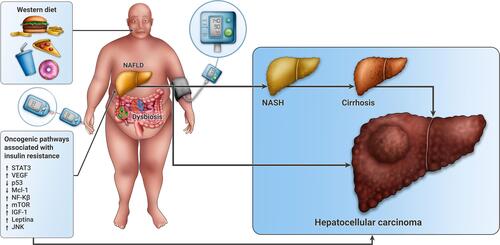Figures & data
Figure 1 Pathophysiology of the association between metabolic syndrome and hepatocellular carcinoma. Excess body weight, hypertension, diabetes mellitus and visceral adiposity are all components of MetS. At the center of this phenomenon lays insulin resistance and fat accumulation in hepatocytes leading to NAFLD. These factors activate prooncogenic pathways, including JNK, NF-kB, mTOR and STAT3, resulting in a tumorigenic prone environment. There is also an upregulation of IGF-1 and leptin, that results in proliferative, antiapoptotic (p53) and angiogenic effects (VEGF) that lead to cancer cell proliferation. Western diet is associated to signal transduction alterations through changes in cell membrane fluidity and to mitochondrial dysfunction that has also been associated with carcinogenesis. Microbiota is involved in the regulation of bile acids synthesis and metabolism, thus affecting hepatic homeostasis. These processes can lead to HCC through cirrhosis or independently.

